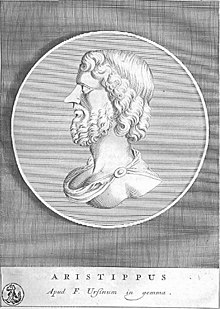
Back أريستبوس Arabic اريستبوس ARZ Aristipp AZ Арыстып BE Аристип Bulgarian Aristip BS Aristip de Cirene Catalan Aristippos z Kyrény Czech Aristippos af Kyrene Danish Aristippos von Kyrene German
Aristippus | |
|---|---|
 | |
| Born | c. 435 BCE |
| Died | c. 356 BCE (aged c. 78 – 79) |
| Era | Ancient Greek philosophy |
| Region | Western philosophy |
| School | Cyrenaic school |
Main interests | Hedonism, Epistemology |
Notable ideas | Hedonism |
Aristippus of Cyrene (/ˌærəˈstɪpəs/; Ancient Greek: Ἀρίστιππος ὁ Κυρηναῖος; c. 435 – c. 356 BCE) was a hedonistic Greek philosopher[1][2] and the founder of the Cyrenaic school of philosophy.[3] He was a pupil of Socrates, but adopted a different philosophical outlook, teaching that the goal of life was to seek pleasure by adapting circumstances to oneself and by maintaining proper control over both adversity and prosperity. His view that pleasure is the only good came to be called ethical hedonism.[4][1] Due to the ideological and philosophical differences between Socrates and himself, Aristippus faced backlash by Socrates and many of his fellow-pupils. Out of his hedonistic beliefs, Aristippus' most famous phrase was, "I possess, I am not possessed."[5] Despite having two sons, Aristippus identified his daughter Arete as the "intellectual heiress" of his work, resulting in the systematization of his work and the Cyrenaic school of philosophy, by Arete, and her son Aristippus the Younger, Aristippus' grandson, during the later years of his life and after his death.[6][1]
There are indications that Aristippus was conflated with his grandson, Aristippus the Younger.[7]
- ^ a b c Mark, Joshua J. "Aristippus of Cyrene". World History Encyclopedia. Retrieved 2023-06-04.
- ^ "Aristippus of Cyrene". World History Encyclopedia. Retrieved 2021-07-22.
- ^ Although the systemization of the Cyrenaic philosophy is generally placed with his grandson Aristippus the Younger.
- ^ Moore, Andrew (2019), "Hedonism", in Zalta, Edward N. (ed.), The Stanford Encyclopedia of Philosophy (Winter 2019 ed.), Metaphysics Research Lab, Stanford University, retrieved 2021-03-28,
Ethical or evaluative hedonism claims that only pleasure has worth or value and only pain or displeasure has disvalue or the opposite of worth.
- ^ "Aristippus | Greek philosopher | Britannica". www.britannica.com. Retrieved 2023-06-04.
- ^ Matson, Watson (2006). Encyclopedia of philosophy. Vol. 2. Donald M. Borchert (2nd ed.). Detroit: Thomson Gale/Macmillan Reference USA. p. 619. ISBN 0-02-865780-2. OCLC 61151356.
Although he had two sons, Aristippus designated his daughter Arete as his intellectual heiress. She in turn bestowed the succession on her son Aristippus call "the Mother-taught."
- ^ Debra Nails, The People of Plato, ISBN 1603844031, p. 50